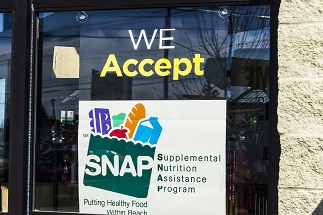Poverty, food insecurity, and poor nutrition have serious consequences for health and well-being across the lifespan. Fortunately, solutions exist to tackle these challenging issues, including increased utilization of the federal nutrition programs and addressing food insecurity in health care settings.
Quick Facts
- People living in or near poverty have worse health outcomes and less access to health care than those who do not.
- Food insecurity — even marginal food security (a less severe level of food insecurity) — is linked to some of the most common and costly health problems in the U.S.
- The direct and indirect health-related costs of hunger and food insecurity in the U.S. have been estimated to be $160 billion.
- Research shows that the federal nutrition programs alleviate poverty, reduce food insecurity, and improve nutrition, health, and well-being.
Explore These Topics
- Poverty is a Health IssueResearch demonstrates that people living in or near poverty have disproportionately worse health outcomes and less access to health care than those who do not. In addition, neighborhoods with many poor or low-income residents often have fewer resources that promote health, but have more environmental threats that harm health, when compared to higher-income neighborhoods.
Poverty reduces life expectancy and quality of life, and increases the risk for a number of health issues.
The health consequences of poverty in childhood include:
- food insecurity;
- obesity;
- lead exposure;
- poor oral health;
- poor growth;
- asthma; and
- behavioral and emotional problems.
The health consequences of poverty in adulthood include:
- diabetes;
- heart disease;
- obesity (primarily among women);
- depression;
- disability;
- poor oral health; and
- premature mortality.
Find out more about the connections between poverty and health.
- Hunger is a Health IssueFood insecurity is associated with some of the most costly and serious health problems in the U.S.
The health consequences of food insecurity for children include:
- poor overall health status;
- low birth weight;
- iron deficiency anemia;
- birth defects;
- asthma; and
- mental health and academic problems.
The health consequences of food insecurity for adults include:
- fair or poor self-rated health status;
- diabetes;
- obesity (primarily among women);
- hypertension;
- pregnancy complications; and
- depression (including maternal depression).
The health consequences of food insecurity for older adults and seniors include:
- poor or fair health status;
- diabetes;
- depression;
- congestive heart failure;
- hypertension; and
- lower cognitive function.
Because of limited financial resources, households that are food insecure also may use coping strategies to stretch budgets that are harmful for health, such as:
- forgoing the foods needed for special medical diets (e.g., diabetic diets);
- making trade-offs between food and other basic necessities (e.g., housing);
- engaging in cost-related medication underuse; and
- postponing preventive or needed medical care.
Finally, household food insecurity is a strong predictor of higher health care utilization and increased health care costs.
Find out more about the connections between food insecurity and health.
- SNAP Improves Health and Well-BeingDecades of research have demonstrated the effectiveness of SNAP in alleviating poverty, reducing food insecurity, and improving the health, nutrition, and well-being of children, adults, and seniors. There also is growing evidence that SNAP reduces health care utilization and costs. Consider the following selection of studies:
- Annual healthcare expenditures are $1,400 lower in the case of SNAP participants versus non-participants (Berkowitz et al., 2017).
- SNAP participation is associated with reduced hospitalization and less costly hospital stays among older adults dually enrolled in Medicare and Medicaid (Samuel et al., 2017).
- Access to SNAP in utero and in early childhood reduces the incidence of metabolic syndrome, reduces the risk of stunting, and, for women, increases reports of being in good health in adulthood (Hoynes et al., 2016).
- Among children, SNAP reduces rates of poor general health, obesity, and anemia (Kreider et al., 2012).
- Older adults participating in SNAP are less likely to engage in cost-related medication nonadherence (Srinivasan et al., 2018). Meaning, they are less likely to delay refilling a prescription, skip medication doses, or take less medication to save money.
Learn more about SNAP’s effectiveness in improving health and well-being.
- The Child Nutrition Programs Improve Health and Well-BeingThere is considerable evidence about the effective role that participation in the federal Child Nutrition Programs plays in reducing food insecurity and providing the nutrients children need for growth, development, and overall health. There also is a growing body of research on how the programs can favorably impact obesity. Consider the following:
- School breakfast has been linked with fewer visits to the school nurse and positive impacts on mental health (FRAC’s Breakfast for Health, 2016).
- Receipt of a free or reduced-price school lunch reduces rates of food insecurity, obesity, and poor health (Gundersen et al., 2012).
- Young children in subsidized child care whose meals are supplied by their child care provider — and, therefore, highly likely to be participating in the Child and Adult Care Food Program — are less likely to be in fair or poor health, less likely to be hospitalized, and more likely to be at a healthy weight than similar children whose meals are supplied from home (Gayman et al., 2010).
- WIC enrollment and greater WIC food package utilization during pregnancy is associated with improved birth outcomes, including lower risk of preterm birth, low birth weight, and perinatal death (Fingar et al., 2017).
Learn more about the positive impacts of these programs on health and well-being.

Hunger is a Health Issue
Learn how health care providers and community-based partners are addressing food insecurity in health care settings.
Recent Publications

The Impact of Poverty, Food Insecurity, and Poor Nutrition on Health and Well-Being
Find out more
The Role of the Supplemental Nutrition Assistance Program in Improving Health and Well-Being
Read more
The Role of the Federal Child Nutrition Programs in Improving Health and Well-Being
Find out more
Addressing Food Insecurity in Health Care Settings: Key Actions & Tools for Success
Read more
The Connections Between Food Insecurity, the Federal Nutrition Programs, and Student Behavior
Find out more
The Importance of the Federal Nutrition Programs for Infants and Toddlers
Read more
WIC is a Critical Economic, Nutrition, and Health Support for Children and Families
Read more
Summer Nutrition and Enrichment Programs: Effective Tools to Support Child Food Security, Health, and Learning During the Summertime
Read more
